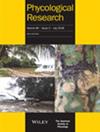Seasonal variation of carrageenan yield, gel strength and viscosity in Sarcopeltis (ex Gigartina) skottsbergii from Southern Chile
IF 1
4区 生物学
Q2 MARINE & FRESHWATER BIOLOGY
引用次数: 5
Abstract
Chile is one of the top carrageenan producers worldwide, and Sarcopeltis (ex Gigartina) skottsbergii one of the topmost exploited carrageenophytes from the wild in the world. Total yield, gel strength and viscosity from two contrasting environments Calbuco and Ancud (Inner and Outer Sea, Chile) were estimated monthly in approximately 2 years for this species. While carrageenan yields did not show differences between localities, gametophytes in spring–summer had 15% higher, compared to tetrasporophytes. Sizes (frond surface) normally did not affect carrageenan yields. Gametophytes showed clear differences in gel strength between seasons, but not between localities, with maximum peaks during winter–spring months in Calbuco and autumn‐winter months in Ancud. Seasonal variations in viscosity were also significant. While gametophyte viscosity did not exceed 120 cPs, tetrasporophytes reached 1400 cPs in Calbuco and 1000 cPs in Ancud. More remarkably, a positive correlation between viscosity and gel strength was found in S. skottsbergii gametophytes, which is significantly different between both localities. These results suggest that selective harvesting in spring–summer should be preferred to optimize cost–benefit of harvesting activities and subsequent carrageenan productivity.智利南部斯科茨贝氏Sarcopeltis (ex Gigartina)卡拉胶产率、凝胶强度和粘度的季节变化
智利是世界上最大的卡拉胶生产国之一,而Sarcopeltis(原Gigartina) skotsbergii是世界上野生卡拉胶开发最多的植物之一。从Calbuco和Ancud(智利内海和外海)两个不同的环境中对该物种的总产量、凝胶强度和粘度进行了大约2年的每月评估。卡拉胶产量在不同地区间无显著差异,春夏配子体产量比四孢子体高15%。大小(叶面)通常不影响卡拉胶的产量。配子体凝胶强度在季节之间存在明显差异,但在地区之间没有明显差异,在Calbuco的冬春月份和Ancud的秋冬月份达到峰值。黏度的季节变化也很显著。配子体黏度不超过120 cPs, Calbuco和Ancud的四孢子体黏度分别达到1400和1000 cPs。更显著的是,黏度与凝胶强度之间存在正相关关系,且在两个地方之间存在显著差异。这些结果表明,为了优化采收活动的成本效益和随后的卡拉胶产量,应优先选择春夏选择性采收。
本文章由计算机程序翻译,如有差异,请以英文原文为准。
求助全文
约1分钟内获得全文
求助全文
来源期刊

Phycological Research
生物-海洋与淡水生物学
CiteScore
3.60
自引率
13.30%
发文量
33
审稿时长
>12 weeks
期刊介绍:
Phycological Research is published by the Japanese Society of Phycology and complements the Japanese Journal of Phycology. The Journal publishes international, basic or applied, peer-reviewed research dealing with all aspects of phycology including ecology, taxonomy and phylogeny, evolution, genetics, molecular biology, biochemistry, cell biology, morphology, physiology, new techniques to facilitate the international exchange of results. All articles are peer-reviewed by at least two researchers expert in the filed of the submitted paper. Phycological Research has been credited by the International Association for Plant Taxonomy for the purpose of registration of new non-vascular plant names (including fossils).
 求助内容:
求助内容: 应助结果提醒方式:
应助结果提醒方式:


